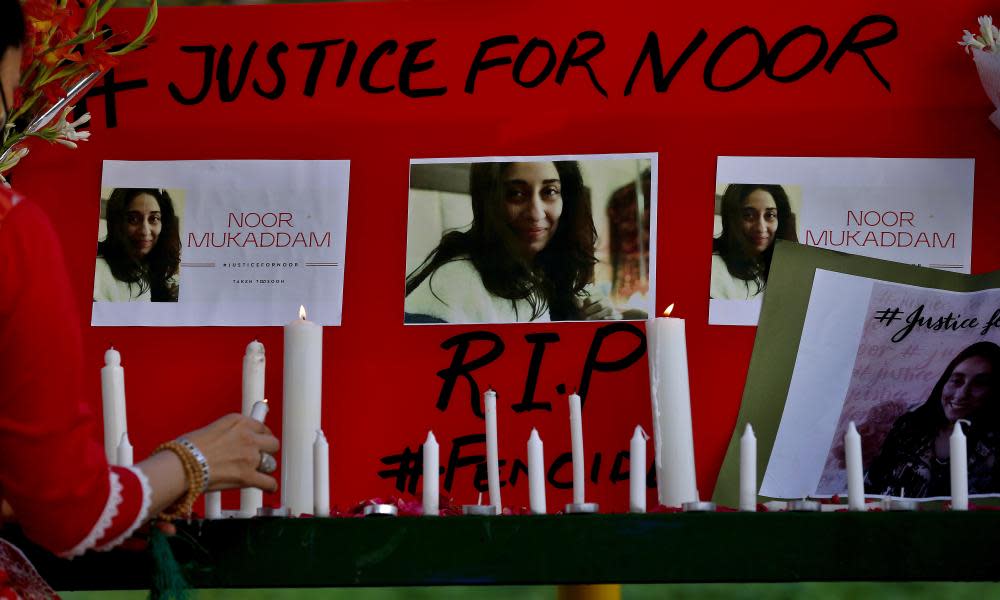Pakistan reckons with its ‘gender terrorism epidemic’ after murder of Noor Mukadam

The family of a 27-year-old woman who was allegedly tortured and beheaded by the son of a business tycoon have spoken of their devastation in a case that has pushed Pakistan to examine what has been called a “gender terrorism epidemic”.
Zahir Zakir Jaffer was arrested on suspicion of the pre-meditated murder of Noor Mukadam, the youngest daughter of a former Pakistani diplomat, after allegedly holding her captive for three days at his apartment in an upmarket area of Islamabad.
The case, involving two of the capital’s richest families, has shone a light on Islamabad’s elite, the offspring of landowners, politicians and business tycoons.
In a country where so-called “honour” killings are common practice, the brutality of the killing has forced Pakistan to confront its poor record on gender-based violence. In the World Economic Forum’s global gender index, the country is ranked 153 out of 156 countries, just above its Taliban-ravaged neighbour Afghanistan.
An artist and animal lover, Noor had just been commissioned to paint her first mural. As a child, Noor spent time in South Korea and Ireland due to her father’s diplomatic role. Friends described her as “down to earth and trusting”. She was concerned about human rights and had taken part in the Aurat march on International Women’s Day earlier this year.
Her father, Shaukat Ali Mukadam, said the family were heartbroken and called for the death penalty for her alleged killer.
“We are shocked and devastated and, as her parents, we are completely broken,” said Mukadam. “Everybody has to go from this world but to lose a child like this is difficult to take. She was so young and a gentle, kind girl.
“It’s not just our family who are grieving, but the whole of Pakistan. I have lost a daughter, but now we are fighting for all women because this could be anybody’s daughter or sister.
“People are all demanding he should be given the death sentence, so nothing short of that, because if people like this continue in society, these murders can happen to anybody.”
After being criticised for their silence on the murder, the Jaffer family issued a statement condemning the suspect.
“The Jaffer family extends its deepest condolences to the family and loved ones of Noor Mukadam. We pray her soul rests in eternal peace. We know that no amount of time will bring back the joy you have lost nor ease your pain,” the statement read.
“Our shock and grief at this horrific act has led to a prolonged silence that we very much regret. However, we categorically condemn this atrocity and forever denounce Zahir and his actions,” it said.
During Covid lockdowns there has been a sharp rise in domestic violence, which many see as fuelled by the growth in religious conservatism and the government’s failure to tackle the issue. A much-lauded domestic violence bill was put on hold in early July after objections by the Council of Islamic Ideology, despite being passed by the National Assembly.
Pakistan’s prime minster, Imran Khan, was condemned after he suggested that the way women dressed was to blame for the rise in sexual violence. He later claimed the comment was taken out of context.
“Women are not just angry, they are terrified because we know far too many rapists and murderers get away with it,” said Kanwal Ahmed, founder of Soul Sisters Pakistan, one of the country’s biggest women-only online Facebook group.
Related: Grief, anger and a curfew as Pakistani activist Karima Baloch buried
“More needs to be done to protect women. There are no resources, no implementation of laws, not even timely statements from the leadership. Not even support for tools as basic as the domestic violence bill. There’s no inclination by the state to let women just exist without the fear of being raped or murdered.”
Activist Leena Ghani, who was involved in the Aurat march and organised a candlelit vigil for Noor, said: “We are all tired of sending our prayers and thoughts every time a case happens. Noor’s case is not an isolated incident. I don’t want any more women to be an example. What we are facing is a gender terrorism epidemic. Why should the Noors of this country have to give up their lives for us to learn a lesson about gender-based violence.”
The status of the two families and the brutality of the crime have brought this case worldwide attention. But for victims from lower-class backgrounds, without money or publicity, the fight for justice is lost before it has even begun.
Among those is Saima Ali, whose father, Raza Ali, a police constable with a history of domestic violence and drug addiction, opened fire on his family, killing his wife, Bushra, 38, and injuring two of his four children at their home in Peshawar.
Raza is currently on the run.
Saima, who spent 10 days in hospital after the shooting, said: “I am a 23-year-old girl pursuing this case without any support. He shot us and left us for dead and the police have done nothing for our protection.
“It’s very hard for women from poor backgrounds to get justice without any influence or support. We face so many barriers to getting justice because of gender discrimination. I miss my mum so much and I’m scared for my family.”
• In the UK, call the national domestic abuse helpline on 0808 2000 247, or visit Women’s Aid. In the US, the domestic violence hotline is 1-800-799-SAFE (7233). In Australia, the national family violence counselling service is on 1800 737 732. Other international helplines may be found via www.befrienders.org

 Yahoo News
Yahoo News 
